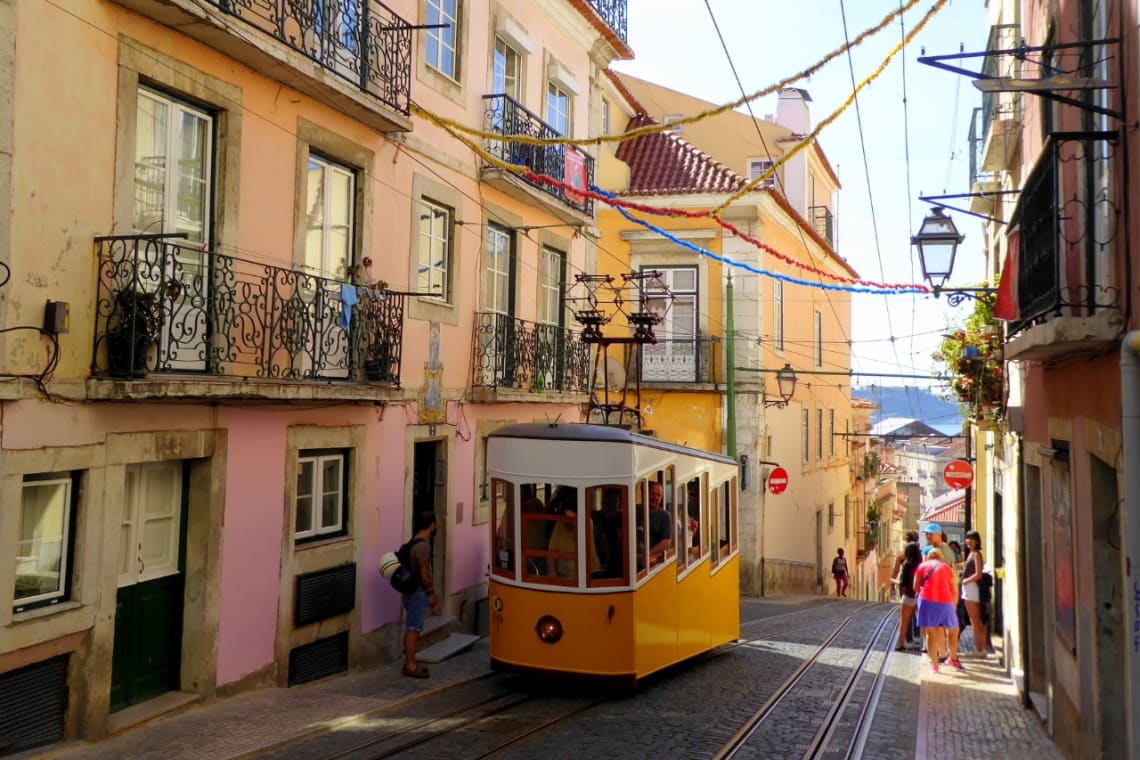
- How about winning a flight ticket worth up to US$500?
- Become a member by January 31st and get a chance to win!
Embark on an enriching journey teaching English in Portugal. Make a difference through education while immersing in the culture and discovering the country.
6min

Teaching English in Portugal is a journey of joy and discovery - You're not just sharing knowledge, but also diving into a captivating culture.
Working in Portugal as an English teacher is more than a mere occupation; it's an opportunity to form meaningful relationship with the locals, to discover the country's stunning landscapes and exciting cities, and also to learn Portuguese.
In this article we'll give you tips and useful information to make your idea of teaching English in Portugal a reality!
You can also consider the idea of teaching English in Spain and teaching English in Italy.

The allure of Portugal's stunning landscapes, rich history, and warm hospitality of its people are just a few reasons why many decide to teach English here. However, it goes beyond these surface-level attractions.
Teaching jobs in this Western European gem offer an opportunity to make a real difference by helping locals enhance their language skills while also immersing oneself into Portuguese culture fully.
Becoming an English teacher is not merely about imparting knowledge; it's about fostering global connections. As you help students improve their communication abilities, you're simultaneously building bridges between cultures - creating mutual understanding that transcends borders.
Your role as an educator extends far beyond your classroom walls. By improving local students' proficiency in English, you're opening doors for them both academically and professionally. This contributes positively towards their development, making every lesson taught feel very rewarding.
Tackling challenges associated with living and working abroad helps develop resilience, adaptability, among other invaluable soft skills. These traits are highly sought after by employers worldwide, making the experience beneficial regardless of long-term career goals involving teaching.
By living and working in Portugal for an extended period, you will have the opportunity to dive into the local culture, experiencing it first-hand and not superficially like tourist do.
An open mind is essential when living in a foreign country to navigate the cultural differences. Be curious about their gastronomy, traditions, local legends, dances, and simple everyday customs.
Beyond helping you navigate daily tasks like shopping at local markets or asking for directions, speaking Portuguese allows you to connect on a personal level with your students and other locals you meet during your stay.
In addition to these social benefits, being bilingual can boost your career prospects too. Possessing proficiency in foreign languages has become a highly sought-after skill today. Hence, adding another string to your bow in terms of linguistic abilities certainly won't hurt when it comes to enhancing your resume for future job applications.
This article about learning a second language while teaching TEFL abroad may help you.
And read the experience of a fellow traveler: "Quitting my job to learn Portuguese as a volunteer in Portugal".
Finally, there's the exciting traveling part that most will consider when they decide to teach English in Portugal.
Lisbon, Porto and the southern beaches are Portugal's most famous tourist destinations, but the country is packed with natural attractions and historical towns. By spending a long time in Portugal, you'll be able to travel up and down the country and discover its hidden gems.
We will talk more about traveling in Portugal later on the article.

Well, there's also the boring but essential part of teaching English in Portugal: the paperwork.
Most English teaching jobs in Portugal will require a working visa (Visto de Procura de Trabalho) or a student visa and a TEFL certificate. A university degree isn't always compulsory, but is mostly required when teaching in formal institutions, as may also be classroom experience (usually 1 year of previous teaching experience).
Regarding the visa, it can be a Portugal Working Holiday Visa, which is easier to obtain than a standard working visa. This program is only valid for certain nationalities (including US nationals) and applicants must be aged between 18 and 30 years old at the time of application. This will allow you to work legally in Portugal for up to 1 year. Check all the requirements at vistos.mne.gov.pt.
Under a student visa you'll be able to work in Portugal up to 20 hours per week and full-time during holidays or non-study periods.
Volunteering positions are more flexible - they are less likely to require a TEFL certificate. In some cases you'll be good to volunteer as a teacher with a tourist visa, as you won't be getting paid, but it all depends on the requirements by the local host.

First, consider which type of experience you would like to have. You can work as an English teacher in Portugal either by finding a paid job or through volunteering.
If you want a paid job, you can find opportunities through any reputable agency that specializes in teaching English as a foreign language, such as International TEFL Academy, Go Overseas and Glass Door.
The other way to teach English in Portugal is through volunteering. Instead of being paid for teaching, your teaching hours will earn you free accommodation and usually some meals. So it’s a work exchange through which your living costs will be significantly lower. This is the type of experience you can find through Worldpackers.
As we've seen before, a benefit of volunteering as an English teacher in Portugal is that this kind of positions are much more flexible with the requirements - most of the times they don't ask neither for prior experience nor for a teaching certificate, and in the case of private lessons you won't need a working/student visa.
Most volunteering jobs don't exceed 20 hours per week, giving you lot of time to explore around. You could even find a paid teaching job as well as any work-exchange in Portugal to have your accommodation and meals covered. From positions in the hospitality industry to eco-programs, there are hundred of opportunities.
Volunteering is not only a great way to save money while traveling, but also an excellent chance to meet a lot of people, both local hosts and international volunteers while making a difference through your help.
To participate, you just need to subscribe to the Worldpackers Community for free and start saving your favorite volunteer positions until you are ready to get verified.
These are just some examples of volunteering positions where you can teach English in Portugal:
Check out all the volunteering opportunities in Portugal.

The chance to experience the local life and travel around the country is definitely one of the most appealing parts of teaching English in Portugal.
Besides the super popular cities of Lisbon and Porto, and the beaches of the Algarve region, there are many magical places to explore, like the historical towns of Aveiro, Braga, Sintra and Coimbra and the lush forests of Peneda-Gerês National Park and the high peaks of the Serra de Estrela.
There's also the world-class surfing scene with popular places like Peniche, Nazaré and Ericeira. Read about "What it's like to do a work exchange at a surf camp in Portugal" to have a first-hand overview from a fellow traveler.
But of course is not all about traveling and having free time when teaching English in Portugal - there's the everyday life too.
With its sunny climate, great gastronomy, friendly locals, rich cultural heritage and low living costs, Portugal is a very attractive destination to live.
Talking about he costs of living in Portugal, there's no doubt that is considerably lower than in other western European countries. For example, you can rent a one-bedroom apartment in Lisbon, the most expensive city in Portugal, for around 800 € a month, and cheaper in cities like Braga, Aveiro or Coimbra. Utility bills can be quite low, typically ranging from 50 – 150 € per month. And an average meal at a local restaurant will cost around 8 – 15 €, but you will save a ton of money by cooking yourself, as groceries are very affordable at local markets and supermarkets.
Read about the Top 15 Best places to visit in Portugal.

Teaching English in Portugal it's a chance to immerse yourself in the rich Portuguese culture, connect with locals, explore this beautiful country and help a lot of people through education.
You'll find that learning Portuguese becomes an integral part of your journey, enriching your experience even further.
And remember - you're not alone on this adventure. With Worldpackers by your side, finding teaching positions becomes easier than ever before! Embark on this life-changing journey of teaching English in Portugal. Make a positive impact while having unforgettable experiences!
Write here your questions and greetings to the author
Abdelrahman
Nov 23, 2023
اا
Houssin
Dec 07, 2023
Yes
Moaaz
Jan 04, 2024
Hey